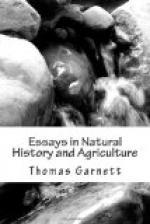Sir,—Through the polite attention of Mr. Cardwell I have been favoured with a copy of your bill—“For the better preservation of Salmon.” As this is a subject to which I have paid some attention, I trust it will not be deemed impertinent if I offer some suggestions for your consideration with regard to the free gap. It appears to me that it will be desirable to specify the width and depth of this free gap, or it may on the one hand degenerate into a mouse-hole, or on the other hand the surveyor, by the provisions of the 13th section of the Act, may insist on such a gap being made that the whole of the water may be diverted through it, which in small rivers, where there are ancient and legal hecks or cruives for the purpose of taking Salmon, will destroy the value of the fishery. Then, with regard to fence time:—In the 6th section of the Act, I presume you do not intend that night fishing shall be allowed at any season of the year; but it appears to me that the expressions in the 6th section would scarcely prevent the owners of cruives from keeping them open, as they need not go near them between sunset and sunrise, and then they will neither lay, draw, nor fish with any net, device, or engine. Would it not be better to expressly insist upon all cruive fisheries being positively closed from sunset to sunrise? or, what would be still better, that the cruive or heck should have a free gap in it, of a specified size, which should be kept constantly open between sunset and sunrise. As this is one of the most important sections of the Act, I may be pardoned for calling your particular attention to it; for unless this section be vigorously enforced, it will be in vain to legislate on the subject;—for the proprietors near the sources of rivers (where most of the fish spawn) will never interest themselves about the preservation of fish which they are not allowed to see when in season, and which has hitherto been the case in this neighbourhood at all events; but if the fish are allowed a free passage everywhere, and at all times, between sunset and sunrise, the upper proprietors will then have some inducement to take care of the fish in the spawning season. Until now, all the good fish have been taken in the fisheries near the mouth of the river.
There is at present a great trade carried on in this neighbourhood in Salmon roe, as a bait for Trout and Eels, and scores of spawning Salmon are now destroyed for little else than the spawn they contain. Cannot this be prevented?
* * * * *
May 5th, 1846.
H. GEORGE, ESQ.
SIR,—I enclose a letter I had addressed to Mr. Pakington on the subject of the preservation of the breed of Salmon. I had written to him because I perceived that he had introduced the bill into the House of Commons, but since that letter was written I have been favoured with your address through the politeness of Sir Thomas Winnington, to a friend of mine, and as he requests that any suggestion about weirs may be addressed to you, I make no apology for enclosing the letter I had addressed to Mr. Pakington with some further suggestions, which on looking over my letter I find I have omitted to notice.




